Monday Feb 16, 2026
Monday Feb 16, 2026
Wednesday, 18 September 2019 00:00 - - {{hitsCtrl.values.hits}}
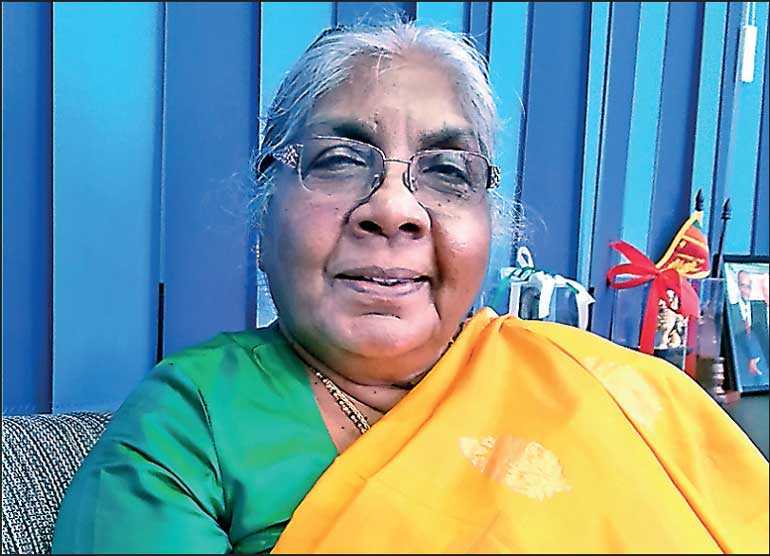
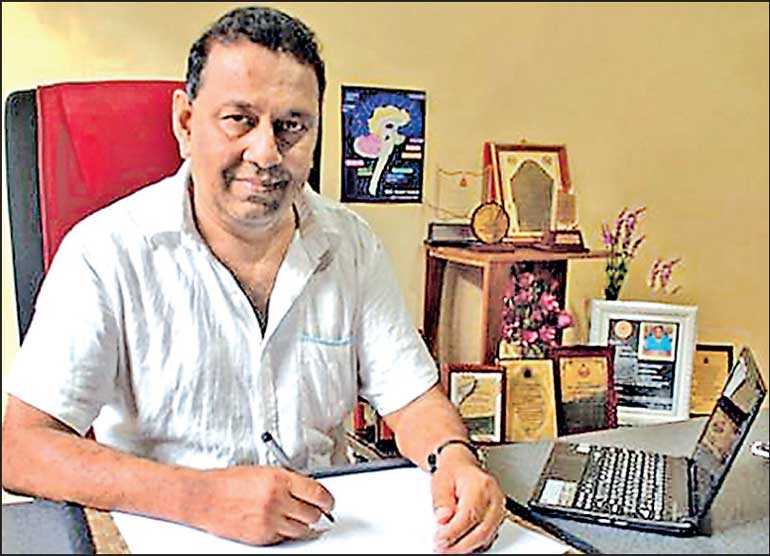
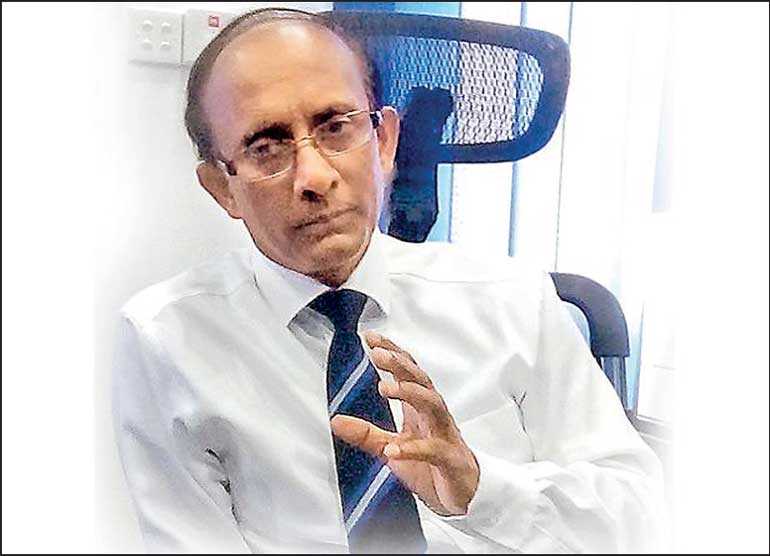
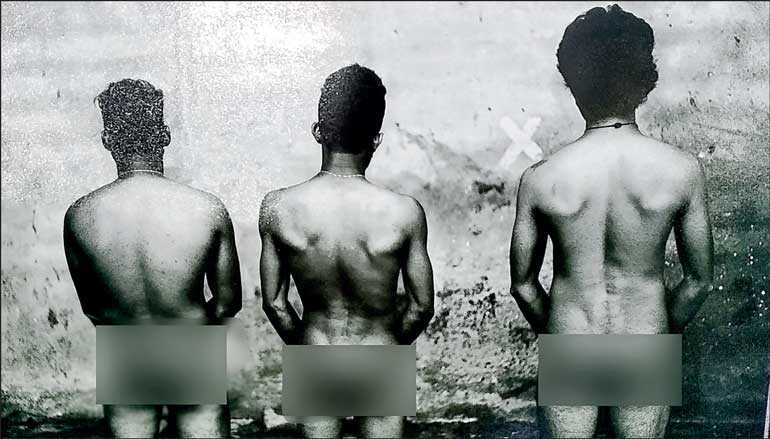
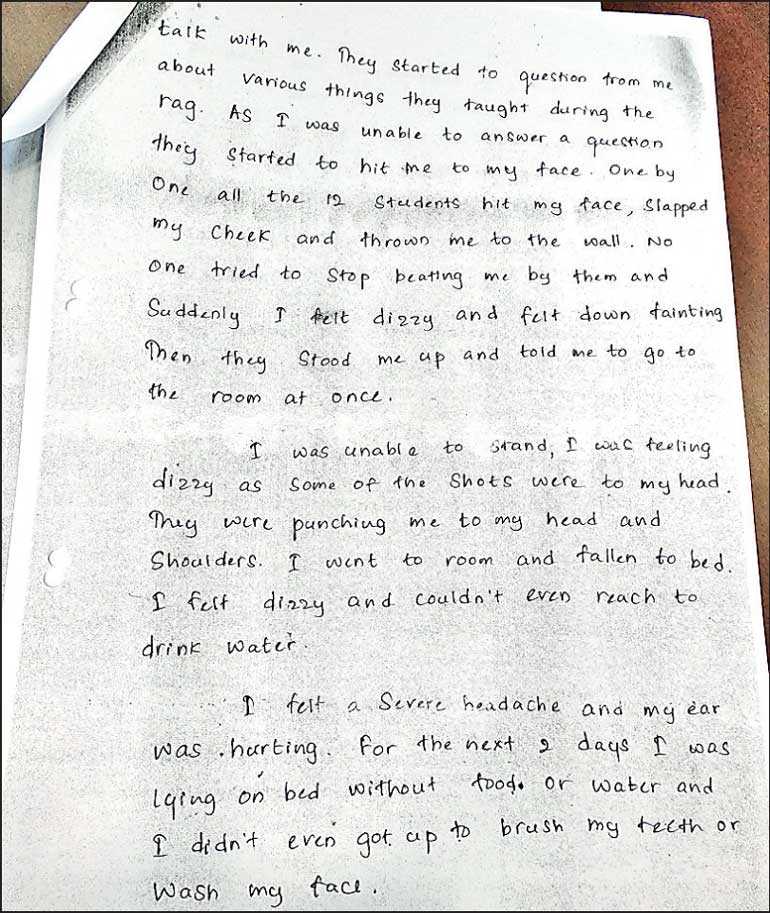
By Shanika Sriyananda
“Dear Sir, my two sons got selected to the Peradeniya University in 2016 and to the Kelaniya University in 2018. My elder son was badly ragged at the Peradeniya University and he was admitted to the Peradeniya Teaching Hospital several times. Once he was taken to the hospital in an ambulance as he was brutally assaulted by senior students. Since there was no end to the ragging, he stopped university education. He got three Bs at the Advanced Level (A/L) Examination and today he is working in a small bakery selling bread.
“My second son, who got selected to the Kelaniya University, is now being subjected to serious ragging. He got three As at the A/L exam and now says he can’t go to the university. Their father is also sick. Please look into my younger son’s matter.”
The above excerpts are from a letter written by a mother to the then Higher Education Minister Wijeyadasa Rajapaksa, requesting him to take action to stop her youngest son from undergoing ragging.
In May 2018, a first year undergraduate of the Engineering Faculty of the University of Ruhuna had written to the University Grants Commission (UGC) Chairman, requesting a transfer to another university as he feared getting ragged severely after he had complained to the university authorities.
When he was at the hostel room, 12 seniors who were drunk had asked questions from what they were taught during ragging that afternoon.
“One by one, all 12 seniors hit my face, slapped my cheeks and threw me to the wall. No one tried to stop beating me. Suddenly I felt dizzy and fell on the ground, unconscious. They were punching my head. I lay on the bed for two days with no food or water as I couldn’t get up,” he explained in this letter about what he had gone through in the university hostel where there is a warden, sub-warden and others, including minor staffers.
After two days, as he still suffered from severe headaches, he had informed his mother, who in return had informed the senior lecturer, who had asked her to take the student home from the hostel immediately for his safety.
“I came home and got treatment immediately (medical certificates can be provided). I had a severe headache and an ear problem. Liquid came out from my ear as an ear infection had occurred due to assault,” he wrote in his letter.
Since he was scared of getting assaulted again by the seniors as he had complained, he states: “As I really want to continue my higher education without any interference by the seniors, please kindly take attempts to transfer me to another university as there is no safe environment to be in the university (Ruhuna),” he said, adding that although lecturers had asked him to name the culprits, he said he was scared as they would beat him again.
This is only one from among heaps of letters received by the UGC from ragging victims from all State universities describing their harrowing experiences as freshers during the university ‘initiation ritual’ or ‘familarising’ of new students to dispel differences among newcomers, to ‘get them into a common culture to have equality’. We withheld their names to protect their identity.
Whether they hail from elite or middle class or poverty-stricken rural families, efforts to get them onto common ground as undergraduates is viewed positively by some who believe it promotes strong bonds, understanding among each other, teamwork, togetherness, brushes up leadership qualities, etc., but who can justify the inhumane physical, sexual and psychological harm that the ‘seniors’ subject the newcomers to in the guise of inculcating the so-called university culture in them?
The Government had introduced guidelines to control the menace of ragging in universities and higher education institutes via a new Act called ‘Prohibition of Ragging and Other Forms of Violence in Educational Institutions Act, No. 20 of 1998’. It has defined ragging as: ‘any act which causes or likely to cause physical or psychological injury or mental pain or fear of a student or a member of the staff of an educational institution’.
Barbaric physical and mental harm
UGC Chairman Prof. Mohan De Silva told Daily FT the so-called sentimental or romantic ragging no longer existed in Sri Lankan universities and instead it had developed into dangerous forms of barbaric physical and mental harm caused to newcomers.
“The students are being tamed to be slaves of seniors,” he said, showing some recent pictures of ragging at the Peradeniya University, where a group of new students had been taken to a house eight km away from the university and kept there naked.
He said in that house which was rented for Rs. 10,000 per month for six months, one student was asked to creep into a small hearth and stay naked in the cold weather from midnight onwards for hours. When the Police raided the house, the student who was guarding the place had been sleeping under the influence of drugs.
“The torture chambers of the University of Visual Arts are in front of the hostel close to the National Zoological Gardens in Dehiwala. We informed this to the university administration but nothing happened and still it continues. Unfortunately this is the crude reality in Sri Lanka,” Prof. de Silva said, adding that under the University Act No. 16 of 1978, powers with regard to student discipline are vested with the VCs and University Councils but sadly no action was being taken.
Meanwhile, Prof. de Silva said students’ unions were organising the ‘welcome’ event after ragging with the full support of the VCs, Deans and the other staffers and the mass event, mostly including religious ceremonies, which gives the students the impression that ragging is a part of the university culture.
He said the universities of Kelaniya and Sri Jayewardenepura were the main bases where ragging was taking place unabated and no tough measures have been taken by the university authorities to support the students to overcome ragging.
“Despite the fact that Prof. Uma Coomaraswamy has been requesting all VCs to support ending ragging in their universities, it goes on unabated. The easiest way to run a university is to let the students’ unions control the university, which means less trouble for the VCs. VCs like the VC of Ruhuna and South East Universities, who strongly oppose ragging, are becoming unpopular. The students are not allowed to talk to VCs, Deans and Heads of Departments when the students’ unions are powerful. They take the university administration into their hands, so those universities are run by them and not the VCs,” he claimed.
When asked whether zero tolerance for ragging in universities was possible, he said they only targeted a significant percentage reduction in ragging incidents but not a total elimination due to present ineffective systems in universities and lack of support or lobby from all the stakeholders including parents and the public.
He said the UGC had done its maximum during the last few years without any powers vested with the UGC to take stern action against the perpetrators.“But, if students who were subjected to ragging go to courts for fundamental rights violations, all of the authorities who are responsible would be charged for their negligence in performing their responsibilities,” he said.
A national campaign against ragging
The UGC Chairman said that it was high time to launch a national campaign with the support of the public, professionals, all State institutions, etc. to save university students from ragging, especially inhumane forms of ragging.
“This has been institutionalised by a political party and it controls the country’s entire university system. I think there a huge responsibility lies with the university authorities – the VCs, Deans and the university councils to address this issue,” he said, adding that even with the guidance of the UGC, when the ragging victims return to their respective universities, the authorities have failed to ensure their safety and create a conducive environment for them to continue with their studies.
Prof. de Silva said VCs needed to be more proactive in addressing ragging in their respective universities and that the UGC informed the Federation of University Teachers’ Association to raise this issue at their forum but nothing had happened so far.
When the UGC had realised that the new students were being meted out with the worst form of cruelty and thousands of them were getting harassed, bullied and abused by the seniors annually, with the collaboration of UGC India an online complaint mechanism – online ragging portal www.ugc.ac.lk/rag/ – was established coupled with the hotline 0112123700 and email [email protected].
This has enabled all ragging victims – new and seniors – and parents or any member of the university community to call or write to get redress from ragging.
UGC Centre for Gender Equity/Equality, Prevention of Sexual and Gender-based Violence and Ragging Director Prof. Uma Coomaraswamy said that the main objective of setting up the Centre in 2017 was to implement a complaints and redress mechanism to promote UGC’s policy of zero tolerance towards ragging and sexual and gender-based violence in universities.
1,989 students left universities
“This issue was not talked about much during the previous years and we found that ragging in universities was getting intense. During the last two years, 1,989 students have left after getting registered to have university education,” she said.
According to Prof. Coomaraswamy, universities are reluctant to speak out about ragging in their universities as they think that it will tarnish their images while students and parents suffer silently in fear of retribution by seniors if they come out to complain.
“Most students told us that complaining to the university authorities is not effective and they do not get any redress as mechanisms adopted by the university authorities are ineffective to save them from ragging. When the raggers hear that they have complained, the form of ragging will be more intense and inhumane so they are scared to speak out,” she explained.
Students can lodge their complaints by directly meeting the VC or Prof. Coomaraswamy.
“In 2017 we received only 80 anonymous complaints on ragging but with building more confidence through awareness today we have 250 complaints received from students and parents. Most students walk into the Centre to lodge their complaints. Darsha Udayanga, who was sexually ragged, came with his mother requesting a transfer to the UGC. Later we supported him to reveal his plight due to ragging to the public,” she said.
Prof. Coomaraswamy, who was the former VC of the Open University and the former Competent Authority of the Eastern University and the South Eastern University, said the UGC had developed a good rapport with the VCs of all universities but the challenge was that the mechanisms – the process of inquiries, preliminary inquiries and fact-finding efforts – within the universities were ineffective and probing into those cases would be halted.
“We started supporting Darsha to reveal his plight of sexual abuse at the Ruhuna University, we got assistance from Additional Solicitor General Rohantha Abeysuriya to instruct the Police to arrest the raggers, got advice from Prof. Deepika Udagama on the violation of Darsha’s human rights and we are also helping him financially,” she said.
According to Prof. Coomaraswamy, no complaints about rape have been lodged to the Centre so far but most girls have reported verbal and psychological ragging.
“Female students may be getting raped and subjected to sexual abuse but they are not complaining to anyone or any authority. Over 700 male students have lodged complaints against ragging but very few girls have come forward to complain,” she said.
A research on ragging and sexual violence in Sri Lankan universities carried out by the UGC and funded by the UNICEF in 2018 using over 15,000 students has revealed that ragging has been extended to ‘pre-enrolment conditioning’ where the new entrants are taken into awareness programs to condition them to defer their seniors; if they do not obey, penalties are imposed by organised students’ groups.
The research states that ragging is pervasive and multifaceted with verbal, physical, psychological and sexual harassment in all State universities. It is gone to the extent of extreme inhumane treatment and is integrated into the university culture.
Culture of fear
“A culture of fear, silence and acceptance has made them continue with ragging. During the orientation programs that are extended from one to three years or more, the new students are harassed, bullied and abused physically, psychologically and sexually by the seniors, made to refrain from speaking in English or using laptops, denied access to libraries and the canteen and forced to get involved in their union activities,” it states.
The report further states that the students who complain against raggers will be further ragged and they avoid complaining as they lack protection and anonymity, mechanisms to address complaints are not effective, there is more sympathy for perpetrators than for victims and complainants get punished.
According to Psychiatrist Dr. N. Kumanayake, ragging was neither a familiarisation nor an introduction freshers to the university environment but a form of psychopathic behaviour of a mentally-disturbed group of youth.
“It is a violation of human rights and a crime which is a punishable offense under law. It spoils victims’ lives forever, lowers their self-esteem, self-respect and self-confidence. They will also end up with various psychological disorders – panic, social phobia, anxiety, Post-Traumatic Stress Disorder (PTSD), depression, stress and Obstructive Compulsive Disorder, etc.,” he explained.
Dr. Kumanayake said that he treated four to five university students subjected to ragging annually and most of them had learning difficulties, flashbacks and poor concentration. Recently he had treated a university student who had been badly ragged in an inhumane way, made to strip naked and assaulted when he was at the hostel.
“When he was brought to me he had PTSD and sleeping disorders due to flashbacks of the incident. He was refusing to return to the university. After giving him medicine and counselling we have been able to convince him to go back to the university but he occasionally has flashbacks,” he said.
According to this student, over 45 of his batch mates had already left the university due to ragging. “He said there was no one to complain to about ragging at the university and even the lecturers keep silent due to fear,” Dr. Kumanayake said.
Outlining the mental status of raggers, Dr. Kumanayake said that most of them were suffering from borderline personality disorders which make them emotionally unstable, with uncontrollable anger, feeling empty and having disturbed personality traits which will lead to a lack of empathy.
“Most students join ragging due to peer pressure and their beliefs that ragging improves the personality of new students, creates emotional bonds and improves social contacts. These are myths that have created the ragging culture in universities. The leaders, who are mostly mentally ill as they were also subjected to serious ragging as new entrants, are vulnerable to anxiety, poor self-worth and self-esteem,” he said.
According to Dr. Kumanayake, most raggers come from poor socio-economic backgrounds, who were victimised as children due to domestic violence and alcoholism. “This also reflects on our society, which has 65% domestic violence and one-third of villagers are alcoholics. Most children are traumatised during their childhood. Their brain system is disturbed due to violence at home and emotionally disturbed due to fathers being alcoholics,” he said.
He also attributed lack of love as children, pressure in education which has made students turned from Grade 5 to 12 into bookworms just to pass examinations and there being no time for recreational and sports activities to enjoy childhood as other reasons.
Dr. Kumanayake said the university authorities needed to strongly adhere to the punishments spelled out in the University Act, reduce educational pressure, introduce short-term and long-term goals to reduce ragging in universities and inculcate empathy in students from primary classes to curb the ragging menace in universities.
“I think it is the best time to start assessing new entrants for their mental stability and if they have some mental disorders, direct them to university counsellors who can play a major role to detect any mental illness early. Most raggers have no empathy to feel the pain of others. Secondly, I request President Maithripala Sirisena to intervene to declare a national anti-ragging campaign similar to the national campaign on the eradication of drug menace to enforce tough laws. Thirdly, a lesson on empathy to teach the young students about how others feel love, repercussions of hurting others by ragging, bullying or assaulting and how it will disturb their studies should be included in the school curriculum. My fourth suggestion is to reduce educational pressure, which places a huge mental burden on students from Grade 10 to 12, who are still children and need to enjoy life as children. We need to introduce a new easy educational system from Grade 5 to 12 that enables children to study and enjoy life without getting caught in a pressurised rat race aimed only at getting high marks in exams to enter universities,” he highlighted.
Dr. Kumanayake said when a child undergoes huge pressure it damages the sensitive brain cells and they become emotionally disturbed and later develop personality issues.
Sick mindset
“When they enter the university, they will continue to have that disturbed personality and will be easily trained to be raggers. In their adulthood as graduates, they would hold top posts, but they would still have issues. I treat professionals who can›t enjoy life at the workplace, family life, sexual life and also social life as they are victims of depressive personalities. The danger is that this will become a vicious circle and their depressive behaviour will pass down to their children and most probably they will also have the same depressive personalities in future,” he said.
He said if dangerous forms of ragging continue, the country would have administrators or professionals with sick mindsets, which would negatively impact decision making.
When going through the complaints received by the UGC, every student or parent has requested the authorities to intervene to stop ragging for them to continue their higher education in the selected universities. Therefore, the time has come for the authorities in the higher education sector to respond to these questions if the Government is genuinely committed to end ragging.
If ragging is a criminal offence in Sri Lanka under this law, how is it still practiced openly with total impunity? What are the special privileges that the university ‘seniors’ are granted to torture freshers? How much are able to escape the common law of the country and who protects them? Why are the university top authorities, who mostly turn a blind eye to ragging, not held responsible by the State as these heinous crimes are taking place under their watch?